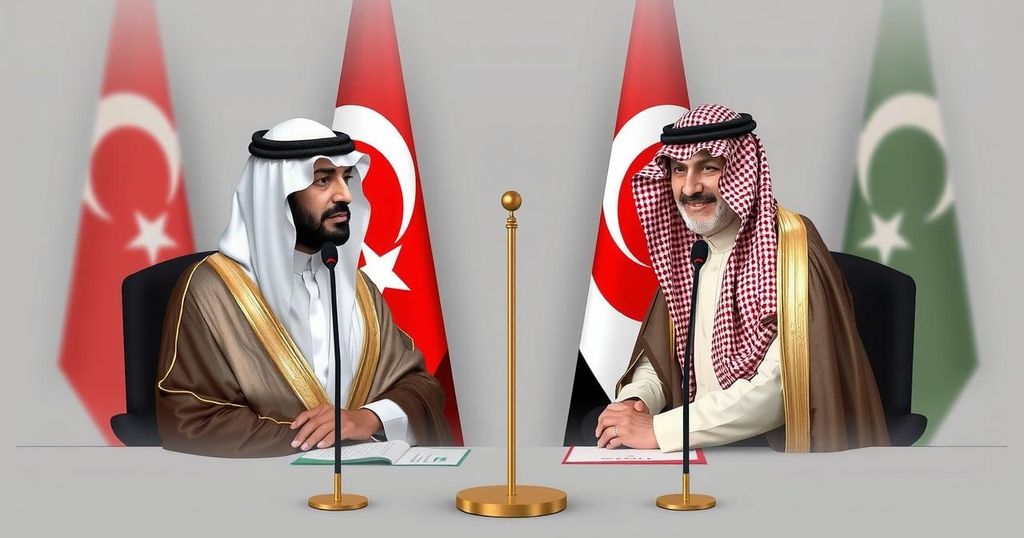Turkey is seeking support from Saudi Arabia and the UAE to stabilize Syria following the decline of Bashar al-Assad’s regime. President Erdogan aims to engage Gulf nations to secure their backing for a neutral Syrian government, collaborating against external influences. Turkish officials are advocating for a cooperative regional order and increased assistance from Western powers for Syria’s reconstruction amid ongoing complexities involving Russia and regional security issues.
Turkey is actively seeking the support of Saudi Arabia and the United Arab Emirates (UAE) to play a pivotal role in shaping the future of Syria following the rapid decline of Bashar al-Assad’s regime. In the wake of this turmoil, Turkish officials express caution and an understanding of the need for regional and Western collaboration to ensure Syria stabilizes, as it is a nation of approximately 20 million citizens prone to chaos similar to that experienced during the Arab Spring.
President Recep Tayyip Erdogan is particularly focused on engaging Gulf nations that have historically been skeptical of groups such as the Muslim Brotherhood to garner their allegiance concerning Syria’s political future. A source close to the government indicated, “The president believes the concerns raised by Saudi Arabia and particularly the United Arab Emirates should be heard, and their advice valued in Syria.”
Erdogan is scheduled to participate in a summit convened in Cairo where he is expected to exchange views with Egyptian President Abdel Fattah el-Sisi about the nascent Syrian government. Both leaders harbor apprehensions concerning the influential role of the extremist group Hay’at Tahrir al-Sham (HTS) in Syria’s government. Despite Turkey denying direct support for HTS, the Turkish Foreign Minister, Hakan Fidan, acknowledged Turkey’s comprehensive understanding of the group, stating, “No one knows this group better than Turkey.”
Moreover, Ankara’s geopolitical ambitions extend beyond casual discourse with its allies; they are deeply intertwined with critical real-world situations that will determine Syria’s governance. Turkish officials prefer the establishment of a neutral Syria that does not threaten the interests of neighboring nations, notably Israel and Iran. Fidan emphasized Turkey’s disinclination toward any form of foreign domination, asserting, “We do not want Iranian domination in the region, nor do we want Turkish domination.”
The aim is to construct a culture of collaboration among Gulf states and Turkey to mitigate external interference in regional matters. Following Turkey’s overtures, leaders of the Gulf nations have begun to reassess their stances regarding Syria, with notable shifts in rhetoric towards supporting reconstruction efforts.
Any revitalization in Syria necessitates substantial financial backing from Gulf states and Western nations. European Commission President Ursula von der Leyen recently indicated increased European engagement in Syria’s recovery, outlining humanitarian assistance efforts, including vital services and infrastructure reconstruction. Conversely, Russia’s involvement remains a critical concern, as it retains military bases in Syria and has historically supported Assad’s regime. Turkey hopes for a mutual recognition agreement between Russia, Iran, and the new HTS-led Syrian administration to foster stability and rebuild the war-torn nation.
The political landscape in Syria has been shaped significantly by the ongoing civil conflict that began in 2011, which saw various factions vying for power, culminating in the weakened state of Bashar al-Assad’s regime. As different powers jockey for influence, Turkey perceives itself as a critical player due to its geographical proximity and regional interests. The Syrian conflict has drawn in numerous countries, each with their agendas, leading to a complex scenario where the interests of local and foreign entities often clash. Turkey’s aspiration for a neutral, cooperative Syria aims to ensure a stable geopolitical environment in the region while countering the influence of groups and nations it deems threatening.
Turkey’s strategic outreach to Saudi Arabia and the UAE underscores its ambition to lead a collaborative effort in establishing a stable and cooperative Syrian governance structure. Acknowledging the multifaceted challenges ahead, including Russian involvement and regional dynamics, Turkey emphasizes the necessity of a neutral Syria that aligns with the interests of surrounding nations. As international stakeholders gravitate towards assisting in Syria’s reconstruction, Turkey’s role as a mediator and advocate will be pivotal in navigating this complex geopolitical landscape.
Original Source: www.middleeasteye.net







